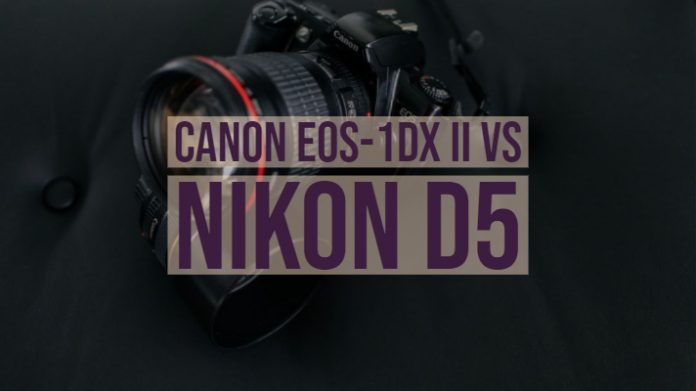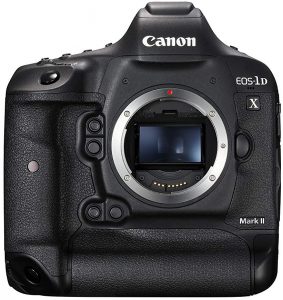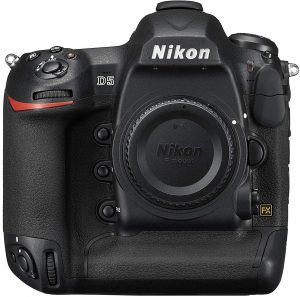Given the fact that both Canon and Nikon have always been at loggerheads to come up with innovative devices when it comes to their DSLR cameras. The result is that consumers tend to get the best options at their disposal. However, this close competition also brings a huge problem in itself. When you find two flagships being launched together, you will find it quite challenging to make a perfect choice between the two. Unless you are deeply invested in any lens ecosystems, it is always a good idea to compare them out. That is where we plan to help you out with this flagship camera comparison. Yes, we will compare the two devices from each of them – Canon EOS-1DX II vs Nikon D5. Let us check out the two cameras from close quarters.
Canon EOS-1DX II vs. Nikon D5 – A Comparison
Instead of going into the debate and reviewing each of the units separately, we will straight away go into the comparison between the two beasts based on a few key features and functions. We will compare the two cameras right away.
The Design
Both those cameras are Pro-grade and enormous enough. If you have weak arms, you may not be able to use them comfortably. The weighty cameras weigh almost 1.5 Kgs. While the Canon 1DX II weighs around 1530 grams, the Nikon offering weighs 1415 grams. But, it would help if you did not view it as a disadvantage. The cameras are designed for professionals, and the photojournalism requirements and the weight should be justified.
Expected to use heavier lenses, the weight and bulk of the cameras seem quite normal and natural. The Nikon D5 offers you more button controls on the rear and thus helps in better controllability. However, Canon offers you three customizable buttons for easy access.
Image Quality
Of course, both the cameras do not boast on the so-called megapixel count. They have a conservative 20MP sensor, but you will find it impressive by every standard when it comes to the quality of the image shot.
The Nikon D5 offers you an excellent option for shooting in a wide range of ISO configurations through extended settings. It provides marginally better performance than the Canon 1 DX II in terms of ISO performance. If you check the maximum ISO settings for the Canon and use the same setup on the Nikon D5, you get better images than the Canon cameras. Nikon also has parameters exceeding this, but they tend to be less useable under practical conditions.
The Dynamic Range
Concerning the sensor specifications, the two cameras come with the same features. Both the cameras’ resolution is almost the same, but for practical purposes – it comes with the same functions.
The Canon 1D X II comes with a better and broader dynamic range than the Nikon D5. It also offers you lossless RAW files. The flexibility in camera performance should provide you a good deal of performance on Nikon D5 when compared to the Canon offering.
Autofocus
When it comes to autofocus and burst performance, they seem to come with similar features once again. However, Nikon stands out a little in terms of autofocus. It has more AF points and cross-type focus points.
The Nikon D5 comes with 153 phase-detection points, of which 99 cross-type points. The Nikon 1DX II will offer you 61 phase-detection points and 41 cross-type focus points. Nikon also scores over Canon’s flagship in terms of low light focussing with -4v than the -3v on the Canon offering.
Video Performance
Both of them come with 4K video compatibility out of the box. But the difference lies in how this has been implemented. From that perspective, Canon 1DX II offers you excellent video quality compared to the Nikon D5.
You can shoot videos in HD at 120 fps and thus be an excellent option for slow-motion photography. It can shoot 4K at 60p. The same numbers for the Nikon D5 are up to 60p and 30p.
Battery Life
Both Canon 1D X II and Nikon D5 are capable options for a power-packed performance. The Nikon D5 wins the race with an incredible 3780 shots per charge. The Canon 1DX II offers you a battery backup of around 1210 shots per charge. That makes Nikon D5 three times more potent than the Canon camera in terms of battery backup.
Please note that these are the CIPA ratings. In practical use cases, you will find them offering better performance than the CIPA rating. That would again make Nikon D5 a powerhouse in terms of battery backup. Unless you are shooting many 4K videos, you will not find any need to use a spare battery.
The Comparison Chart: Canon EOS-1DX II vs Nikon D5
Well, that was what we have concerning the best features offered by both Canon and Nikon flagships. How do they compare from the specification point of view? We will check it out with the following head-to-head comparison table.
| Features / Particulars | Canon EOS-1DX II | Nikon D5 |
| Sensor resolution | 20.2 MP | 20.8 MP |
| Sensor type | CMOS | CMOS |
| Size of the sensor | 36 x 24 mm | 35.9 x 23.9 mm |
| Low pass filter | Yes, available | Yes, available |
| Image Size | 5,472 x 3,648 pixels | 5,568 x 3,712 pixels |
| Base ISO | ISO 100 | ISO 100 |
| Native ISO range | ISO 100 to 51200 | ISO 100 to 102400 |
| Extended ISO range | ISO 409000 | ISO 3280000 |
| Image Processor engine | Dual Digic 6+ | Expeed 5 |
| Viewfinder magnification | 0.76x | 0.72x |
| Flash built-in | No | No |
| Storage options | One no CFast, one no CF | Two nos XQD or 2 nos CF |
| Continuous shooting performance | 14 fps with AF/AE | 12 fps with AF/AE |
| Highest shooting speed | 16 fps | 14 fps |
| Buffer size | 170 | 200 |
| Maximum shutter speed | 1/8000 for 30 sec | 1/8000 for 30 sec |
| Shutter durability | 400000 cycles | 400000 cycles |
| Autofocus system | 61 points, of which 41 are cross-type | 153 points, of which 99 cross-type points |
| LCD screen | 3.2″ diagonal TFT-LCD | 3.2″ diagonal TFT-LCD |
| LCD screen resolution | 1,620,000 dots | 2,359,000 dots |
| LCD articulation | No | No |
| LCD touchscreen | Yes | Yes |
| GPS connectivity | Yes | No |
| WiFi and NFC connectivity | No | No |
| Battery Life | 3780 shots | 1210 shots |
| Battery type | LP-E19 Lithium-ion Battery | EN-EL18a Lithium-ion Battery |
| Weather sealing | Yes | Yes |
| USB version supported | USB 3.0 | USB 3.0 |
| Physical Dimensions | 158 x 168 x 83mm | 160 x 158.5 x 92mm |
| Weight | 1530 grams | 1405 grams |
| Video recording limit | Unlimited | Three minutes |
| Autofocus detection | Up to f/8 | Up to f/8 |
Concerning the above differentiation, it should be noted that the Nikon D5 is available with two variants. You can go with the version with the two XQD slots or opt for two CF slots.
Which one should you go With?
These are two flagships from the two huge manufacturers. So, which among the two should be a good option? Let us share our viewpoints here.
If you are looking to shoot stills and checking out the video shooting capabilities, Canon 1D X II comes across as an excellent option. It can shoot stills at a faster performance. And we have made it clear that it is the best in comparison when it comes to video shooting. In sharp contrast, the Nikon D5 will provide you access to an excellent autofocus system. One of the best button customization options coupled with a unique touch screen implementation should make it a good competitor.
A great battery life offered by the Nikon D5 is an excellent option, especially while traveling. It can also provide you good color images even in conditions of dark environments. However, when it comes to daylight photography – a better ISO performance should be an excellent option.
In essence, it should finally boil down to the following inferences. The Canon 1DX II is an excellent option for videography, landscape shooting, and 4K video. On the other hand, Nikon D5 should be one of the best options for shooting over a prolonged period (thanks to an excellent battery backup), an excellent AF system, and the ability to shoot in the dark. The choice is yours.
In Conclusion
That was the complete breakdown for an excellent comparison between the two competing devices. Given that both of them are flagships from the respective manufacturers, we would find that both the brands have their fans. We assume the comparison as presented above should provide you complete information on which one you should go with.
If you have used any of them in your day-to-day usage, share your thoughts and experiences with us. That can help us make the right choice.



